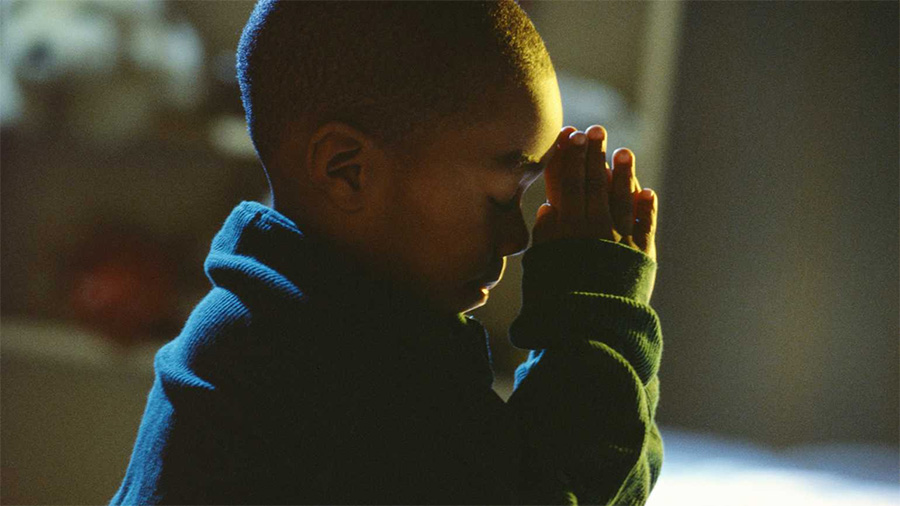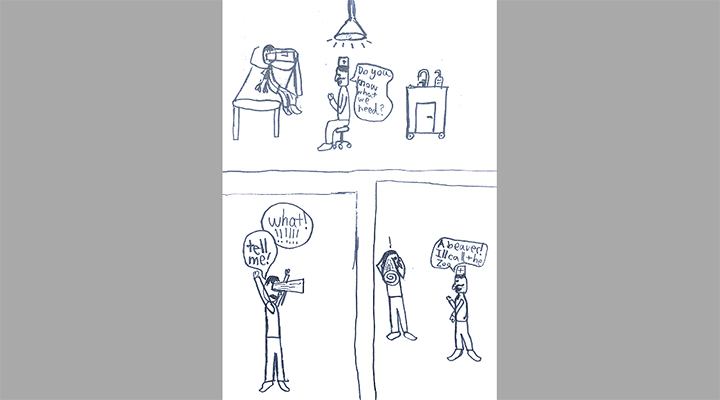 Cultivating truth, goodness, and beauty grounded in the Christian worldview
Cultivating truth, goodness, and beauty grounded in the Christian worldview Cultivating truth, goodness, and beauty grounded in the Christian worldview
Cultivating truth, goodness, and beauty grounded in the Christian worldview

In October of 1911, Norwegian explorer Roald Amundsen would lead the first successful expedition to reach the South Pole. A second British expedition, led by explorer Robert Falcon Scott, would follow three weeks later with the same objective. Although both expeditions were filled with men of courage, vision, and ambition, only Amundsen and his team would return alive. In his book Great by Choice , Collins argues that the Norwegian explorer exhibited all the right behaviors, in contrast to Scott, that would help his team succeed in an environment of uncertainty and chaos. In September, I decided to share some insights from Collins book that we might implement as a school community as we seek to navigate a season of uncertainty and chaos. Collins says, "Amundsen and Scott achieved dramatically different outcomes not because they faced dramatically different circumstances... They had divergent outcomes principally because they displayed very different behaviors." Many factors contributed to the demise of the British expedition but one of the most fateful was arguably Scott's gamble on using untested motor-sledge engines. The failure of the engines only 50 miles into the trip forced the group to man-haul 740 pounds of supplies for much of the journey. The success of the British expedition was too heavily reliant on a new and untested idea. Amundsen and his team, on the other hand, began their expedition with the tried, true, and tested: four sledges, an abundance of provisions, and fifty two dogs. Amundsen was disciplined enough to not trust their fate to a new idea. As we continue to work through this difficult season, Stonehaven need not reinvent the educational wheel. Collins argues that fanatic discipline is one of the three character traits necessary for times like these. He defines this form of discipline as, "Consistency of actionーconsistency with values, consistency with long-term goals, consistency with performance standards, consistency of method, consistency over time... True discipline requires the independence of mind to reject pressures to conform in ways incompatible with values, performance standards, and long-term aspirations."

In my younger years, every night before bed, my mother guided my sister and I in the classic prayer, "Now I Lay me Down to Sleep." I often took this ten-second ritual for granted and recited it without conviction or thought. However, I believe the routine was effective in reminding me where my soul ultimately resided... "I pray the Lord my soul to keep." It taught me a particular dogma of our Christian faith that we are not our own, we were bought with a price, and our body and soul belong to our Savior Jesus Christ (1 Corinthians 6:19-20). In our age of science, the teaching of religious dogma has been branded as an enemy to not only rational thinking but also goodness itself. Atheist Sam Harris argues that, "the maintenance of religious dogma always comes at the expense of science." Philosopher Immanuel Kant believed that, "The death of dogma is the birth of reality." It is fair to say that modernity has placed dogma in the proverbial dog house. It is worthwhile to wrestle with these accusations as a Stonehaven education unapologetically teaches our children Christian dogma. Dogma is defined as a "a principle or set of principles laid down by an authority as incontrovertibly true." The school's statement of faith is not taught in our classrooms as one of many options from the mantle of religious ideas. Our catechism is taught to our children as dogma, principles laid down by the authority of the Christian church, and inextricably linked to their Christian faith. Christian morality, ethics, dogma, or even the existence of our souls can't be observed under a microscope and verified in a science laboratory. As hard as one might try, no one is able to avoid adherence to "religious" dogma whether it be Christian dogma or secular humanistic dogma. G.K. Chesterton says, "In truth, there are only two kinds of people; those who accept dogma and know it, and those who accept dogma and don't know it." The question is not whether or not we will teach dogma to our children but rather will we teach them the true dogma that provides meaning, value, and purpose to their existence.
Even in the middle of the 20th century, Sayers was seeing many in the Christian church question the need for the certainty implied by the dogmatic doctrines of historic Christianity. Believing the church was fearful of offending people with the unvarnished truth of the gospel, Sayers said, "We do him singularly little honor by watering down his personality till it could not offend a fly. Surely it is not the business of the Church to adapt Christ to men, but to adapt men to Christ." The goal of a Stonehaven education is to adapt our children to Christ and teach them the full truth of the gospel. When we remove the offense of the gospel, we are left with no gospel at all (1 John 15:18-21). It is not rare to find a Christian teacher that carefully avoids any discussion, doctrine, or idea in an effort to avoid offense. We find one of many examples of this when some years ago a group of Christians questioned the need for the line "the wrath of God was satisfied" in the hymn In Christ Alone . They proposed replacing this unnecessary phrase with "the love of God was magnified." It is not hard to follow the logic. "Why can't we focus on the more comforting ideas of God?" The reason is that the love of God and the holiness of God can't coexist unless his wrath has been satisfied. Our children need a robust Christian faith that speaks all the truth of God's word: his love, his justice, his mercy, his wrath, his compassion, his righteous anger, and ultimately his holiness. They need these truths preached in their home, in their church, and in their school. Sayers says, "It is the dogma that is the dramaーnot beautiful phrases nor comforting sentiments, nor vague aspirations to lovingkindness and uplift, nor the promise of something nice after deathーbut the terrifying assertion that the same God who made the world lived in the world and passed through the grave and gate of death. Show that to the heathen, and they may not believe it; but at least they may realize that here is something that a man might be glad to believe."

One of the more popular ideas of modernity is the idea that the silver bullet to the most challenging problems in our world is a good education. The hope and even expectation is that poverty, hatred, and war could be eradicated if all our children had access to high-performing schools. The world defines "good" or "high-performing" as those schools with the highest test scores and strongest college acceptance statistics. Martin Luther King Jr. wrestled earnestly with the ultimate purpose of education. He was confronted with many examples of what society might call a well-educated person but saw first-hand how their education was divided from moral action. In a college newspaper article for Morehouse college, Dr. King illuminates this disconnectedness in a former Georgia governor, "The late Eugene Talmadge, in my opinion, possessed one of the better minds of Georgia, or even America. By all measuring rods, Mr. Talmadge could think critically and intensively; yet he contends that I am an inferior being. Are those the types of men we call educated?" Therefore, Dr. King concluded that an, "Education without morals is like a ship without a compass, merely wandering nowhere." The great thinkers of history have arrived at similar conclusions recognizing the vital role of virtue in education. C.S. Lewis believed an education without values made “man a more clever devil," Theodore Roosevelt argued that an education of the mind alone created "a menace to society" and Aristotle said if you weren’t educating the heart it was "no education at all." Every school affirms the goodness of teaching virtue, character, and values. However, not every school places this as their central aim: as the primary "measuring rod" of success. Dr. King reminds us that, "We must remember that intelligence is not enough. Intelligence plus character–that is the goal of true education. The complete education gives one not only power of concentration, but worthy objectives upon which to concentrate."

"Why do some companies thrive in uncertainty, even chaos, and others do not?" This is the question researcher and author Jim Collins seeks to answer in his book Great by Choice . Do I need to justify why I have chosen to read this book in the year 2020? Collins wrote the book in response to the uncertainty following the events of 9/11. Collins seeks to communicate the DNA of companies that navigate the chaos; "They don't merely react; they create. They don't merely survive; they prevail. They don't merely succeed, they thrive." I will tackle this book one chapter per month and share with you all how the principles in this book apply to our school during a tumultuous year. In the first chapter, Collins tackles five common myths about companies that succeed in difficult times. The first myth is that organizations need bold, risk-seeking visionaries to manage turbulent times. They actually found that the leaders of the companies that thrived through chaos were not able to predict the future. Nor were they risk takers. Collins found that, "They were more disciplined, more empirical, and more paranoid." Disciplined is defined as the ability, "to control the way you behave and to make yourself do things that you believe you should do." It would be difficult to imagine a more chaotic situation than being the pilot of a plane that has lost all engine power after striking a flock of Canadian geese. US Airways Pilot Chesley Sullenberger was confronted with this terrifying dilemma on January 15, 2009 and miraculously glided the plane to a safe landing on the Hudson River. We can certainly recognize the creativity and boldness of Sullenberger’s actions but these would have been of little value without his focused discipline. A discipline formed over many years of intentional training. Sullenberger had spent thirty years flying commercial aircraft, specializing in accident investigations, and instructing flight crews on how to respond to crises in the air. When discussing how he responded he said, "I had to force myself to use my training and force calm on the situation... I think in many ways my entire life up to that moment had been a preparation to handle that particular moment." I would encourage our school community to 'force calm' upon the challenges we currently face and will face in the coming months. Keep calm and discipline on.
The five myths Collins describes in his book are the following:
Entrenched myth: Successful leaders in a turbulent world are bold, risk-seeking visionaries.
Contrary finding: The best leaders we studied did not have a visionary ability to predict the future. They observed what worked, figured out why it worked, and built upon proven foundations. They were not more risk taking, more bold, more visionary, and more creative than the comparisons. They were more disciplined, more empirical, and more paranoid.Entrenched myth: Innovation distinguishes 10X companies in a fast-moving, uncertain, and chaotic world.
Contrary finding: To our surprise, no. Yes, the 10X cases innovated, a lot. But the evidence does not support the premise that 10X companies will necessarily be more innovative than their successful comparisons; and in some surprise cases, the 10X cases were less innovative. Innovation by itself turns out not to be the trump card we expected; more important is the ability to scale innovation, to blend creativity with discipline.Entrenched myth: A threat-filled world favors the speedy; you’re either the quick or the dead.
Contrary finding: The idea that leading in a “fast world” always requires “fast decisions” and “fast action” - and that we should embrace an overall ethos of “Fast! Fast! Fast!” -is a good way to get killed. 10X leaders figure out when to go fast, and when not to.Entrenched myth: Radical change on the outside requires radical change on the inside.
Contrary finding: The 10X cases changed less in reaction to their changing world than the comparison cases. Just because your environment is rocked by dramatic change does not mean that you should inflict radical change upon yourself.Entrenched myth: Great enterprises with 10X success have a lot more good luck.
Contrary finding: The 10X companies did not generally have more luck than the comparisons. Both sets had luck-lots of luck, both good and bad-in comparable amounts. The critical question is not whether you’ll have luck, but what you do with the luck you get.
I am not going to discuss in detail each of these findings in this blog post. Rather, I look forward to exploring some of these findings in future posts as we look at how organizations thrived during difficult times. For now, the takeaway is to recognize that success during times of uncertainty is not dependent on taking risks, innovation, responding quickly, radical change, and good luck. Let us pray that the Lord blesses us with discipline, patience, consistency, and thoughtful change to navigate the turbulent waves in the path ahead.

Philosopher Malcolm Gladwell has become famous for popularizing what is called the 10,000 hours rule. In his book Outliers he says, "In fact, researchers have settled on what they believe is the magic number for true expertise: ten thousand hours." He argues that to be great at anything, it requires 10,000 hours of deliberate practice in one particular discipline. The poster child for this idea is golfer Tiger Woods. Introduced to the game of golf at a very young age, he was already gaining recognition on national television shows before he turned three. Undoubtedly, Woods reached the "magic number" of 10,000 hours faster than most of his golfing peers. Although specialization at a young age certainly helped Woods, there is a significant amount of evidence showing that specializing in a certain skill at a young age is often not the best path towards future success. In his TED talk, David Epstein makes a convincing case that a "sampling period" where you try new things and focus on building a range of skills is more valuable than honing one particular skill. Epstein summarizes saying, "breadth of training predicts breadth of transfer. That is, the more contexts in which something is learned, the more the learner creates abstract models, and the less they rely on any particular example." This is at the core of a classical liberal arts education: the idea that our children are best prepared for their future world when they have been exposed to a breadth of learning encouraging them to integrate all of life. Tennis star Roger Federer, musician Duke Ellington, mathematician Maryam Mirzakhani, and Nintendo game designer Gunpei Yokoi are all examples of highly successful people that indulged in a sampling period before finding their area of expertise. Ellington shunned music lessons as a kid to focus on baseball, painting, and drawing. Mirzakhani, the only woman to win the Fields medal for mathematics, dreamed as a young girl of being a novelist. Was their "wandering" a waste of precious time or might it have been exactly what they needed to nurture their particular gifts? In addition, researchers have found that nobel prize winning laureates were twenty-two times more likely to have a hobby. Could it be that fishing, sewing, and gardening will help our children become better teachers, doctors, and engineers? At the very least, their lives will be more enjoyable with their exposure to the wonderful breadth of God's world.

On a whim, I chose to take a stained glass elective class during my junior year of high school. I can imagine that the 17-year-old in me was simply looking for the easiest, most fun option. Unfortunately, it is unlikely I was taking the class for the right reasons. For our final assignment, we were essentially allowed to choose any project we wanted within a broad criteria of expectations. My mother had requested I make a stained glass chandelier to live above our dining room table. After a month of focused work, the crowning achievement of my stained glass experience was finished and later installed in our dining room. After twenty plus years, when I visit my childhood home, I can't help but smile when I see the chandelier hanging in the dining room. The craftsmanship is average at best and many visitors to our home have possibly noticed the many imperfections. Imperfections my mother refuses to acknowledge. But... there is a unique satisfaction in creating something with your own hands. One of the programs we are so excited to launch this school year is our manual arts program. Woodworking with Mr. Cown and Robotics with Mr. Rickman are the first two classes of the program that we launched this fall. Like myself, many of you remember manual arts from your younger years as Shop Class. A classical school is often known for the demands and expectations we place on thinking, reasoning, and the expression of esoteric ideas. However, Stonehaven believes that training our kids to work with their hands, although neglected in our knowledge age, is a valuable tool for their intellectual growth. To find a convincing argument for this idea, one can read Matthew Crawford's fine book, Shop Class as Soulcraft . He says, "The satisfactions of manifesting oneself concretely in the world through manual competence have been known to make a man quiet and easy. They seem to relieve him of the felt need to offer chattering interpretations of himself to vindicate his worth, He can simply point: the building stands, the car now runs, the lights are on."

Woodworking bird houses
Crawford, a philosopher mechanic, has experienced work both in a Washington D.C. "think tank' and in the greasy environs of a motorcycle shop. One important aim in his book is to dismiss the typical stereotype that the manual arts might require a muscled arm but don't necessitate a bright mind. Crawford says, "craft knowledge has entailed knowledge of the 'ways' of one's materials-that is, knowledge of their nature, acquired through disciplined perception and a systematic approach to problems." Those engaged in manual arts are consistently challenged to solve problems that require creativity, patience, and perseverance. The best craftsmen are those that find elegant solutions to the tricky problems of their trade. A skilled electrician can recognize the brilliance of another electrician by looking at their work, "the sight of a gang of conduit entering a large panel... bent into nestled, flowing curves, with varying offsets, that somehow all terminated in the same plane." An experienced electrician sees a special form of beauty in such work.
In the last thirty years, the idea of Shop Class has become a thing of the past for most schools. Some might even believe, "that it is irresponsible to educate the young for the trades, which are somehow identified as the jobs of the past." Stonehaven is going to swim against the current and introduce our children to the beauty of woodworking, engines, cooking, farming, gardening, pottery, sewing, and maybe even stained glass. A rich educational experience using their hands (at school and at home) will not be a nice-to-have for our children but rather a must-have. These experiences will train them to use both their minds and their hands and in so doing will form their very souls.




